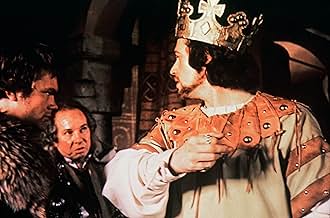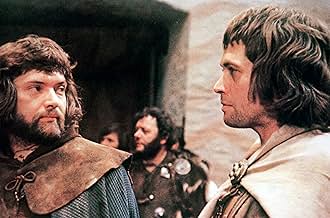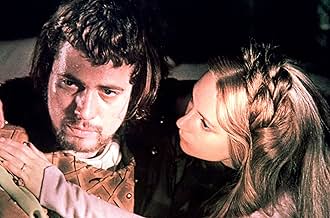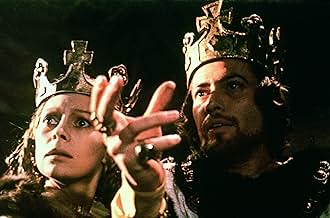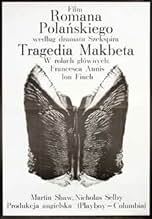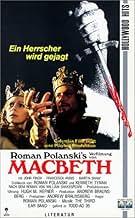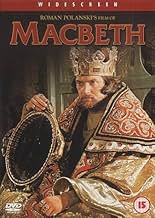AVALIAÇÃO DA IMDb
7,4/10
16 mil
SUA AVALIAÇÃO
Um implacável e ambicioso escocês assume o trono com a ajuda da sua esposa e um trio de bruxas.Um implacável e ambicioso escocês assume o trono com a ajuda da sua esposa e um trio de bruxas.Um implacável e ambicioso escocês assume o trono com a ajuda da sua esposa e um trio de bruxas.
- Direção
- Roteiristas
- Artistas
- Ganhou 1 prêmio BAFTA
- 3 vitórias e 2 indicações no total
- Direção
- Roteiristas
- Elenco e equipe completos
- Produção, bilheteria e muito mais no IMDbPro
Avaliações em destaque
THE PLOT: Through ambition, greed, and the spurring of his wife a man rises to the ranks of King, but leaves murder, destruction, guilt, and a wide array of enemies in his wake.
THE POSITIVE: This is visually stunning from beginning to end. The photography of the Scottish landscape seems almost surreal. Although some may argue that the violence is excessive it is still well done and works in a nice lyrical fashion with the script. The gory special effects are very realistic and top anything that I have seen in any slasher movie especially the decapitation scene. The witches also come off as looking very frightening here. The scene in their coven where you see dozens of fully nude elderly women is grotesquely brilliant. This is one Shakespeare rendition that doesn't have any of the stiff staginess. The characters seem to be having real conversations and their lines are spoken in a much more natural way. Finch is absolutely perfect in the lead. The facial expressions that he show during Macbeth's different phases are fascinating and right on target. This would be a good version to show to teenagers and others who might not ordinarily be into Shakespeare. The action is well mounted and paced so anyone would be able to follow it even if they are not able to completely grasp the language.
THE NEGATIVE: Outside of a relentlessly bleak visual style that may be too much for some there really isn't anything negative about it.
THE LOWDOWN: This is the best film adaptation to Shakespeare's work that I have seen. It is exciting, graphic, realistic, visual, and captivating all at the same time even for those that may not be into Shakespeare.
THE RATING: 8 out of 10.
THE POSITIVE: This is visually stunning from beginning to end. The photography of the Scottish landscape seems almost surreal. Although some may argue that the violence is excessive it is still well done and works in a nice lyrical fashion with the script. The gory special effects are very realistic and top anything that I have seen in any slasher movie especially the decapitation scene. The witches also come off as looking very frightening here. The scene in their coven where you see dozens of fully nude elderly women is grotesquely brilliant. This is one Shakespeare rendition that doesn't have any of the stiff staginess. The characters seem to be having real conversations and their lines are spoken in a much more natural way. Finch is absolutely perfect in the lead. The facial expressions that he show during Macbeth's different phases are fascinating and right on target. This would be a good version to show to teenagers and others who might not ordinarily be into Shakespeare. The action is well mounted and paced so anyone would be able to follow it even if they are not able to completely grasp the language.
THE NEGATIVE: Outside of a relentlessly bleak visual style that may be too much for some there really isn't anything negative about it.
THE LOWDOWN: This is the best film adaptation to Shakespeare's work that I have seen. It is exciting, graphic, realistic, visual, and captivating all at the same time even for those that may not be into Shakespeare.
THE RATING: 8 out of 10.
Vehement and inch-perfect approach of Roman Polanski towards Shakespeare's greatest play "Macbeth". Polanski's absolute narrative technique and profound direction set the heinous deed of Macbeth and his tragic fate with elegance.
He brilliantly represents all Shakespearean symbols on the screen--- especially the floating "dagger", apparitions in the witches' den. Jon Finch powerfully portrays the downfall of Macbeth while Annis appears vivid struggling with her greed and conscience. Vibrantly, one of the mightiest adaptations from Shakespeare's :p
8/10__:D
He brilliantly represents all Shakespearean symbols on the screen--- especially the floating "dagger", apparitions in the witches' den. Jon Finch powerfully portrays the downfall of Macbeth while Annis appears vivid struggling with her greed and conscience. Vibrantly, one of the mightiest adaptations from Shakespeare's :p
8/10__:D
"The Tragedy of Macbeth" (simply abbreviated "Macbeth" on most video covers) is a violent retelling of Shakespeare's classic story. Macbeth (Jon Finch), the Scottish Thane of Glamis, conspires with his wife Lady Macbeth (and three strange witches) to kill the widely-respected King Duncan. After committing the awful deed, Macbeth begins hallucinating, hearing strange omens of death and haunting words; his wife similarly becomes worried with Macbeth's bloodlust, and Duncan's son convinces himself that Macbeth was involved in some way with the killing.
"Macbeth" is a true tragedy, and chances are you already know a great deal about it as it seems to be a high school requirement that it be read by all students. The remarkable thing about Roman Polanski's movie is that it is not only a painfully accurate retelling of William Shakespeare's story, but doesn't flinch when it comes to violence.
According to IMDb's trivia section (and I can't honestly say how reliable this information is, mind you), Polanski included very violent scenes (such as Duncan's death, which is NOT detailed in the original text) because the movie was filmed around the same time period of Sharon Tate's brutal murder, and it was Polanski's way of venting stress and anger. One must imagine what happens to Duncan in this film is what Polanski wanted to do to the Manson family members (and you certainly can't blame him).
As such, knowing the circumstances of what brought about the violence, it is more forgivable and certainly maintains a haunting element - some kind of historical relic, just in knowing that it was filmed during such a terrible time in Polanski's life.
The movie as a whole is wonderful. As I mentioned above, its accuracy (in comparison to Shakespeare's text) is spot-on -- entire scenes of dialogue are taken directly from the source, and even the strong violence lends the film a more realistic nature.
Overall, it's an epic and (sadly) somewhat forgotten Shakespeare epic. If you enjoyed "Hamlet" or "Romeo and Juliet" (the '60s version) you'll certainly find this engaging, and - at times - rather shocking, too.
"Macbeth" is a true tragedy, and chances are you already know a great deal about it as it seems to be a high school requirement that it be read by all students. The remarkable thing about Roman Polanski's movie is that it is not only a painfully accurate retelling of William Shakespeare's story, but doesn't flinch when it comes to violence.
According to IMDb's trivia section (and I can't honestly say how reliable this information is, mind you), Polanski included very violent scenes (such as Duncan's death, which is NOT detailed in the original text) because the movie was filmed around the same time period of Sharon Tate's brutal murder, and it was Polanski's way of venting stress and anger. One must imagine what happens to Duncan in this film is what Polanski wanted to do to the Manson family members (and you certainly can't blame him).
As such, knowing the circumstances of what brought about the violence, it is more forgivable and certainly maintains a haunting element - some kind of historical relic, just in knowing that it was filmed during such a terrible time in Polanski's life.
The movie as a whole is wonderful. As I mentioned above, its accuracy (in comparison to Shakespeare's text) is spot-on -- entire scenes of dialogue are taken directly from the source, and even the strong violence lends the film a more realistic nature.
Overall, it's an epic and (sadly) somewhat forgotten Shakespeare epic. If you enjoyed "Hamlet" or "Romeo and Juliet" (the '60s version) you'll certainly find this engaging, and - at times - rather shocking, too.
Dark, bloody and brooding version of Shakespeare's play about a doomed Scottish king who was, according to his wife, Lady MacBeth "too full of the milk of human kindness to catch the nearest way". This is one of Shakespeare's later plays and is entirely devoid of some of the lighter moments prevalent in his earlier work.
Macbeth, a loyal Scottish thane and a cousin of King Duncan, is waylaid with his companion, Banquo, by three witches who prophesise that he will become king and that Banquo will beget kings. Once MacBeth has informed his wife of these predictions, he is propelled by her and by his own lust for power on a journey of self-destruction leading ultimately to madness. In his determination to bring about the witches' predictions, he kills his liege-lord, steals the crown from the rightful heirs, who flee into exile on suspicion of regicide and patricide, then orders the secret murder of ally and friend Banquo and Banquo's son Fleance. So begins a descent into a nightmare existence, replete with ghostly apparitions, sleepless angst and withering self-doubt. Gradually mutual distrust emerges between himself and the nobles whose support maintains his position, and eventually he murders the wife and children of one MacDuff, an act which symbolises the horror he has become. MacDuff, along with other Scottish nobles, has joined the exiled heir, Malcolm, who lives under the protection of the English king. An army of rebellion - or liberation - is brought to bear on MacBeth's stronghold, whilst inside, MacBeth has begun "to grow aweary of the sun". The witches have told him that he cannot be killed by any "man of woman born". But, in the final fight scene, he learns too late that MacDuff "was, from his mother's womb, untimely ripped" and that the witches have, in Banquo's words from the start of the play, won him "with honest trifles" and betrayed him "in deepest consequence", and his destruction is complete.
This is a suitably melancholic reading, full of images of blood, of sombre leaden skies, of torrential downpours and of thickset, bearded nobles. Scotland is presented as a gloomy outcrop on the edge of the known world and the sun has been heavily filtered by Polanski, giving the film a surreal and eerie feel and stressing the superstitious environment in which the play is set. We are also treated to a fair representation of the early Middle Ages, a time when travelling lords and ladies and their kith and kin slept communally on straw in the great halls, side by side with their massive hunting dogs.
The obviously archaic dialogue has been abridged and everso slightly updated for modern audiences. The lines are delivered eloquently by the two leads, Jon Finch and Francesca Annis, who are well matched as the doomed couple, and this clipped entry would be a good introduction to Shakespeare for those of the MTV-set with a literary inclination. All in all a good stab at bringing Shakespeare into the twentieth century and an effort which the bard himself might well have smiled upon.
Macbeth, a loyal Scottish thane and a cousin of King Duncan, is waylaid with his companion, Banquo, by three witches who prophesise that he will become king and that Banquo will beget kings. Once MacBeth has informed his wife of these predictions, he is propelled by her and by his own lust for power on a journey of self-destruction leading ultimately to madness. In his determination to bring about the witches' predictions, he kills his liege-lord, steals the crown from the rightful heirs, who flee into exile on suspicion of regicide and patricide, then orders the secret murder of ally and friend Banquo and Banquo's son Fleance. So begins a descent into a nightmare existence, replete with ghostly apparitions, sleepless angst and withering self-doubt. Gradually mutual distrust emerges between himself and the nobles whose support maintains his position, and eventually he murders the wife and children of one MacDuff, an act which symbolises the horror he has become. MacDuff, along with other Scottish nobles, has joined the exiled heir, Malcolm, who lives under the protection of the English king. An army of rebellion - or liberation - is brought to bear on MacBeth's stronghold, whilst inside, MacBeth has begun "to grow aweary of the sun". The witches have told him that he cannot be killed by any "man of woman born". But, in the final fight scene, he learns too late that MacDuff "was, from his mother's womb, untimely ripped" and that the witches have, in Banquo's words from the start of the play, won him "with honest trifles" and betrayed him "in deepest consequence", and his destruction is complete.
This is a suitably melancholic reading, full of images of blood, of sombre leaden skies, of torrential downpours and of thickset, bearded nobles. Scotland is presented as a gloomy outcrop on the edge of the known world and the sun has been heavily filtered by Polanski, giving the film a surreal and eerie feel and stressing the superstitious environment in which the play is set. We are also treated to a fair representation of the early Middle Ages, a time when travelling lords and ladies and their kith and kin slept communally on straw in the great halls, side by side with their massive hunting dogs.
The obviously archaic dialogue has been abridged and everso slightly updated for modern audiences. The lines are delivered eloquently by the two leads, Jon Finch and Francesca Annis, who are well matched as the doomed couple, and this clipped entry would be a good introduction to Shakespeare for those of the MTV-set with a literary inclination. All in all a good stab at bringing Shakespeare into the twentieth century and an effort which the bard himself might well have smiled upon.
To say that this adaptation is a bit of a bloodbath is a bit of an understatement, but you cannot deny that this film from Roman Polanski is quite possibly the definitive film version of Shakespeare's play, which is very complicated to even contemplate transcribing to screen. The cinematography is excellent, as is the script. It is true that there are a lot of disturbing scenes, chiefly Lady Macbeth's nude sleepwalker scene and King Duncan's death. Roman Polanski should be commended for how much he managed to get into the film, and he somehow made it all effective. Any scene with the three witches, the murder of Macduff's family, plus the part when Macbeth sees Banquo's ghost was very well done.(I saw an amateur production of this, and not only was it disappointing, but that particular scene was the worst aspect of it) The performances were brilliant, Jon Finch(who did start off uncomfortable) is great on the whole as the treacherous thane-turned-king, and Francessca Annis was nigh-on-perfect as Lady Macbeth. And Martin Shaw was excellent as Banquo. From the suitably eerie opening scene, to the superb climax, this is a near-perfect adaptation, there were just some bits that were really disturbing to watch, that deserves more recognition. 9/10 Bethany Cox
Você sabia?
- CuriosidadesMark Dightam, who was eleven when he controversially appeared full frontally naked as MacDuff's son, was not allowed to see the film when it was released because it had been classified AA and he was under 14 at the time.
- Erros de gravaçãoThe lyrics to the song that Fleance sings at Macbeth's banquet for Duncan at Inverness are taken from the poem "Merciles Beautè" by Geoffrey Chaucer. In the context of the film this extraneously inserted song is itself an anachronism, as Chaucer lived in the fourteenth century and Shakespeare's "Macbeth" historically takes place in the eleventh century.
- ConexõesFeatured in Aquarius: Two Macbeths/Hayward Gallery/Ravi Shankar (1972)
Principais escolhas
Faça login para avaliar e ver a lista de recomendações personalizadas
- How long is Macbeth?Fornecido pela Alexa
Detalhes
- Data de lançamento
- Países de origem
- Central de atendimento oficial
- Idioma
- Também conhecido como
- Bi Kịch Của Macbeth
- Locações de filme
- Lindisfarne Castle, Holy Island of Lindisfarne, Northumberland, Inglaterra, Reino Unido(Glamis Castle, Inverness)
- Empresas de produção
- Consulte mais créditos da empresa na IMDbPro
Bilheteria
- Orçamento
- US$ 3.100.000 (estimativa)
- Tempo de duração2 horas 20 minutos
- Cor
- Proporção
- 2.35 : 1
Contribua para esta página
Sugerir uma alteração ou adicionar conteúdo ausente



